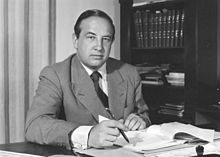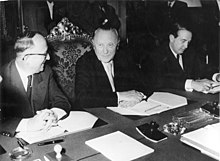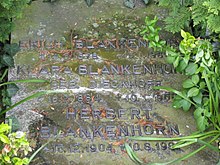Herbert Blankenhorn
Herbert Blankenhorn (born December 15, 1904 in Mulhouse , then Reichsland Alsace-Lorraine , German Empire ; † August 10, 1991 in Badenweiler ) was a German diplomat . From 1929 he was a member of the Foreign Office , since December 1938 a member of the NSDAP ( membership number 6.977.147), headed the economic department of the German legation in Bern in 1943 and became head of the Foreign Office. After the Second World War he became one of the most influential professional diplomats in the Federal Republic of Germany . The first beginnings of German foreign policy in the post-war period are associated with his name .
Life
Herbert Blankenhorn was the son of the professional officer Erich Blankenhorn . During the Nazi era , he was last active as Legation Councilor, 1st class, and was taken into US custody on April 2, 1945. He was asked by the Secret Service Office of Strategic Services (OSS) about inside knowledge from his time as embassy attaché in Washington from 1935 to 1939. During the interrogation, he succeeded in “placing himself in the light of the resistance and deriving from it the claim to work on the future of Germany under anti-communist auspices ” - although he was not a resistance fighter himself and the American Foreign Minister Edward Stettinius called him “an active Nazi and an aggressive one Propagandists ”.
Blankenhorn joined the CDU in 1946 and was initially elected secretary of the zone advisory council for the British zone of occupation from 1946 to 1949 . After the first Adenauer government took up office in 1949, he became personal assistant to the Federal Chancellor and, as ministerial director, headed the Foreign Affairs Office in the Federal Chancellery . Until the revision of the Occupation Statute in March 1951, the Federal Republic was not allowed to have a Foreign Ministry . After its establishment in 1951, which he had decisively prepared as head of the department, Blankenhorn became head of the local political department. In this function he was subordinate to the then Foreign Minister Konrad Adenauer , who held this office in addition to his chancellorship.
In 1953 Blankenhorn became the permanent representative of the federal government to NATO , and from 1955 onwards with the rank of ambassador . From 1958 to 1963 he represented the Federal Republic as ambassador in Paris , from 1963 to 1965 in Rome and from 1965 to 1970 in London .
Blankenhorn was a member (closest circle) of Adenauer's delegation, which traveled to Moscow in September 1955 and there the return of the last soldiers and civilian deportees held in the Soviet Union returned .
In 1958, the Bonn Regional Court raised the charge that he had passed on the denunciations against the ministerial official Hans Strack without reviewing the allegations. In 1970 the General Conference of UNESCO elected Blankenhorn to its Executive Council; 1974-1976 he was deputy chairman of this executive council.
Honors
- November 28, 1951: Circular No. 628 from the Federal Department of Justice and Police
- 1955: Large Cross of Merit with Star of the Federal Republic of Germany
- 1970: Large Cross of Merit with star and shoulder ribbon
Works
- Herbert Blankenhorn: Understanding and Understanding: Sheets of a Political Diary 1949 to 1979. Propylaen Verlag, Frankfurt am Main 1980, ISBN 3-549-07396-8
literature
- Blankenhorn, Herbert . In: Carola Stern , Thilo Vogelsang , Erhard Klöss and Albert Graff (eds.): Dtv-Lexicon for history and politics in the 20th century , dtv, Munich 1974, vol. 1, p. 97.
- Eckart Conze , Norbert Frei , Peter Hayes, Moshe Zimmermann : The Office and the Past. German diplomats in the Third Reich and in the Federal Republic . Karl Blessing Verlag, Munich 2010, ISBN 978-3-89667-430-2 .
- Hans-Jürgen Döscher : rope teams. The Foreign Office's suppressed past . Propylaea, Berlin 2005, ISBN 3-549-07267-8 .
- Birgit Ramscheid: Herbert Blankenhorn (1904–1991). Adenauer's foreign policy advisor . Droste, Düsseldorf 2006, ISBN 978-3-7700-1901-4 .
- Herbert Elzer: The Schmeisser Affair. Herbert Blankenhorn, the "Spiegel" and the activities of the French secret service in post-war Germany (1946–1958). Steiner, Stuttgart 2008, ISBN 978-3-515-09117-6 .
- Maria Keipert (Red.): Biographical Handbook of the German Foreign Service 1871–1945. Published by the Foreign Office, Historical Service. Volume 1: Johannes Hürter : A – F. Schöningh, Paderborn et al. 2000, ISBN 3-506-71840-1 , pp. 173-175
Web links
- Witness literature online. ZS 2476/1, Blankenhorn, Herbert (PDF; 20.7 MB) Institute for Contemporary History Munich / Berlin. Summary Fischer of the survey on April 21, 1975 and script of the survey, regarding Adenauer's assessment of a West German defense contribution; different attitudes of the occupying powers about the Federal Republic and their position in the European system etc.
- Witness literature online. ZS 2476/2, Blankenhorn, Herbert (PDF; 20.7 MB) Institute for Contemporary History Munich / Berlin. Protocols of Blankenhorn's interviews regarding Adenauer's assessment of a West German defense contribution; different attitudes of the occupying powers about the Federal Republic and their position in the European system etc.
Individual evidence
- ↑ Foreign Office / Nazi diplomats: Someone in the house . In: Der Spiegel . No. 14 , 1971 ( online ).
- ↑ Eckart Conze , Norbert Frei , Peter Hayes, Moshe Zimmermann : The office and the past. German diplomats in the Third Reich and in the Federal Republic . Munich 2010, p. 336.
- ^ The Zone Advisory Board of the British Occupied Zone. Edited and introduced by his former Secretary General Gerhard Weisser , Göttingen 1953, p. 144.
- ^ Thomas Knoll: The Bonn Federal Chancellery: Organization and functions from 1949–1999 . Springer VS, Wiesbaden 2013, p. 84 f.
- ↑ Blankenhorn, Herbert . In: dtv lexicon on history and politics in the 20th century , ed. v. Carola Stern , Thilo Vogelsang , Erhard Klöss and Albert Graff, dtv, Munich 1974, vol. 1, p. 97.
| predecessor | Office | successor |
|---|---|---|
| –––– |
Permanent representative of Germany to NATO in Brussels 1955–1959 |
Gebhardt von Walther |
| Manfred Klaiber |
German ambassador in Rome 1963–1965 |
Hans-Heinrich Herwarth von Bittenfeld |
| Hasso von Etzdorf |
German ambassador in London 1965–1970 |
Karl-Günther von Hase |
| personal data | |
|---|---|
| SURNAME | Blankenhorn, Herbert |
| BRIEF DESCRIPTION | German diplomat, member of the NSDAP |
| DATE OF BIRTH | December 15, 1904 |
| PLACE OF BIRTH | Mulhouse |
| DATE OF DEATH | August 10, 1991 |
| Place of death | Badenweiler |


